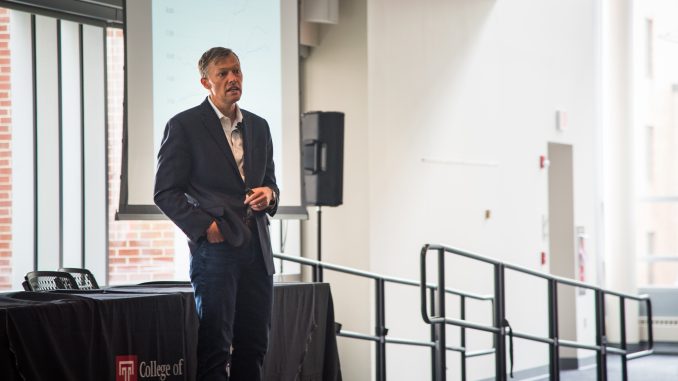
Not only do academics rarely interact with others outside of their own field, but they usually don’t discuss research happening in a field outside their expertise, either.
“I sort of do one thing,” said Annemarie Hindman, associate professor in the College of Education. “Most of the people I talked to on a daily basis are people who are doing the thing that I do.”
So for Hindman and many other academics from across the country, the College of Liberal Arts’ Public Policy Lab brought an exciting learning opportunity when hosting its inaugural symposium on Thursday in the Howard Gittis Student Center.
About 320 attendees registered for the symposium, including Temple students, faculty and staff, as well as people from Philadelphia’s city government, local community organizations and non-profit organizations, according to Judith Levine, the Public Policy Lab’s director.
The Public Policy Lab, located on the 10th floor of Gladfelter Hall, serves as a place for faculty, research, and graduate fellows from liberal arts fields to study public policies and social processes.
Levine said that she wanted the symposium to be about having a conversation.
“We kind of wanted a mixture of thinking about these ‘process’ kinds of questions, and how people can work best with each other, and really concrete information about current policy issues,” she said. “So people can walk away with thoughts about how to conduct work, but also with new knowledge.”
The free, day-long public event included three panels: on universities and public policy, early childhood education, and immigration policy and reform.
Panelists included Public Policy Lab fellows and professors from Temple, University of Pennsylvania, University of Chicago, Georgetown University, Rutgers University, and Princeton University.
Panels last around 75 minutes and each panelist was given 10 to 15 minutes to speak on their designated topics, and then answered questions from the audience for the last half hour.
Hindman, who spoke on the early childhood and education panel at the symposium, said that it was “neat” to connect with people in her field as well as people in Philadelphia who early childhood education policies were directly affecting.
“I learned a ton,” she added. “And I think there was just such an interesting array of different perspectives, that I really had a chance to think about early childhood in a way that’s much more diverse than how I typically think about it.”
Tariem Burroughs, a third-year PhD candidate in the department of sociology, attended the early childhood and education panel because as a former early childhood education practitioner, he wanted to see how policy is playing into early childhood education today.
“There needs to be a bigger connection between those in policy and those on the ground who are actually engaging in [early childhood education],” he said.
Matthew Desmond, Pulitzer-Prize winning author of “Evicted: Poverty and Profit in the American City”, who is also a sociology professor at Princeton University, closed the event with his address.
Desmond said that he thinks the founding of the Public Policy Lab was a great thing to generate cross-discipline conversation.
“At a time when the university seems to be shrinking a little bit, and academic disciplines are becoming more specialized, we’re getting sort of into silos and silos, but now we have this amazing room that’s happening here,” he added.


Be the first to comment